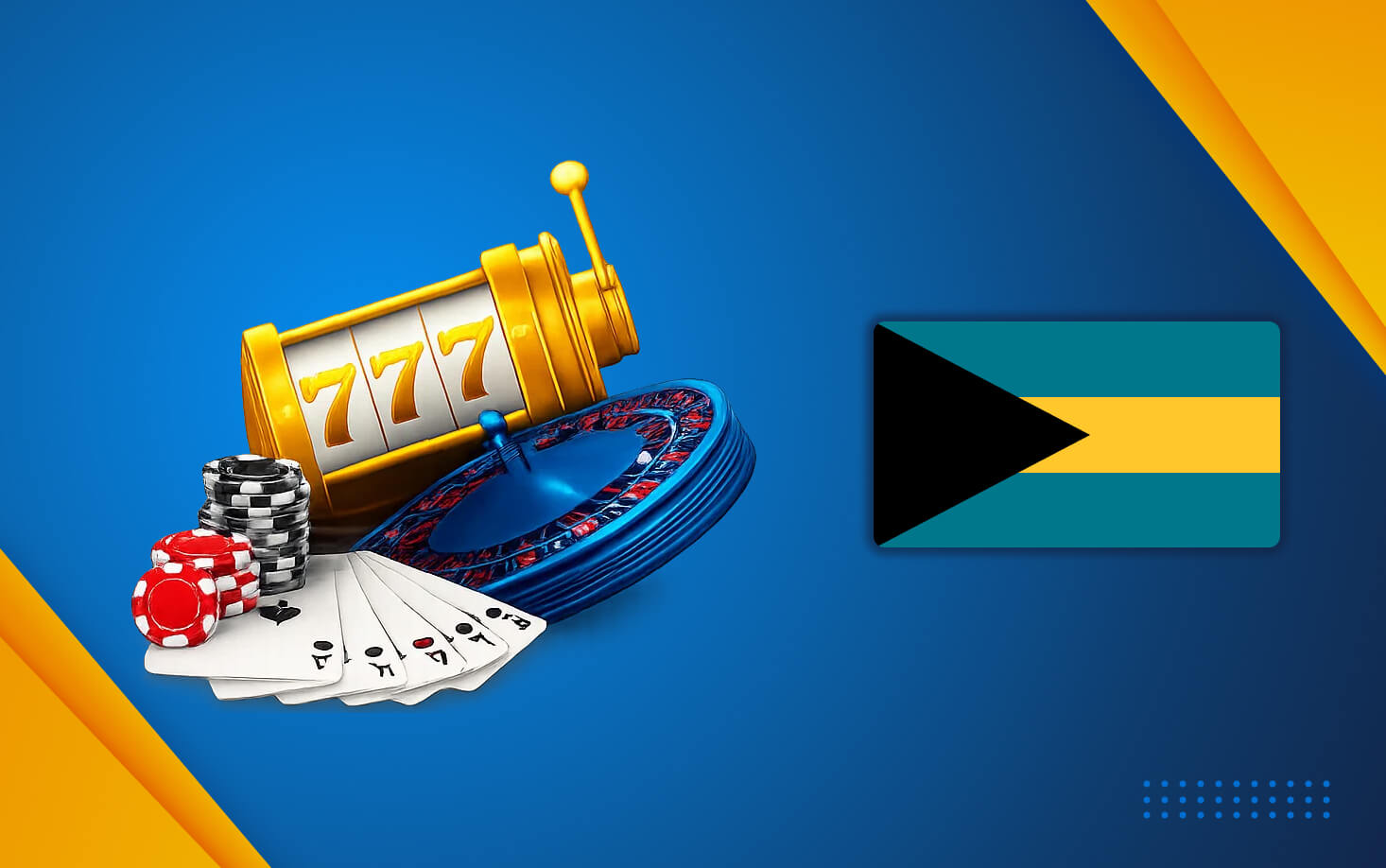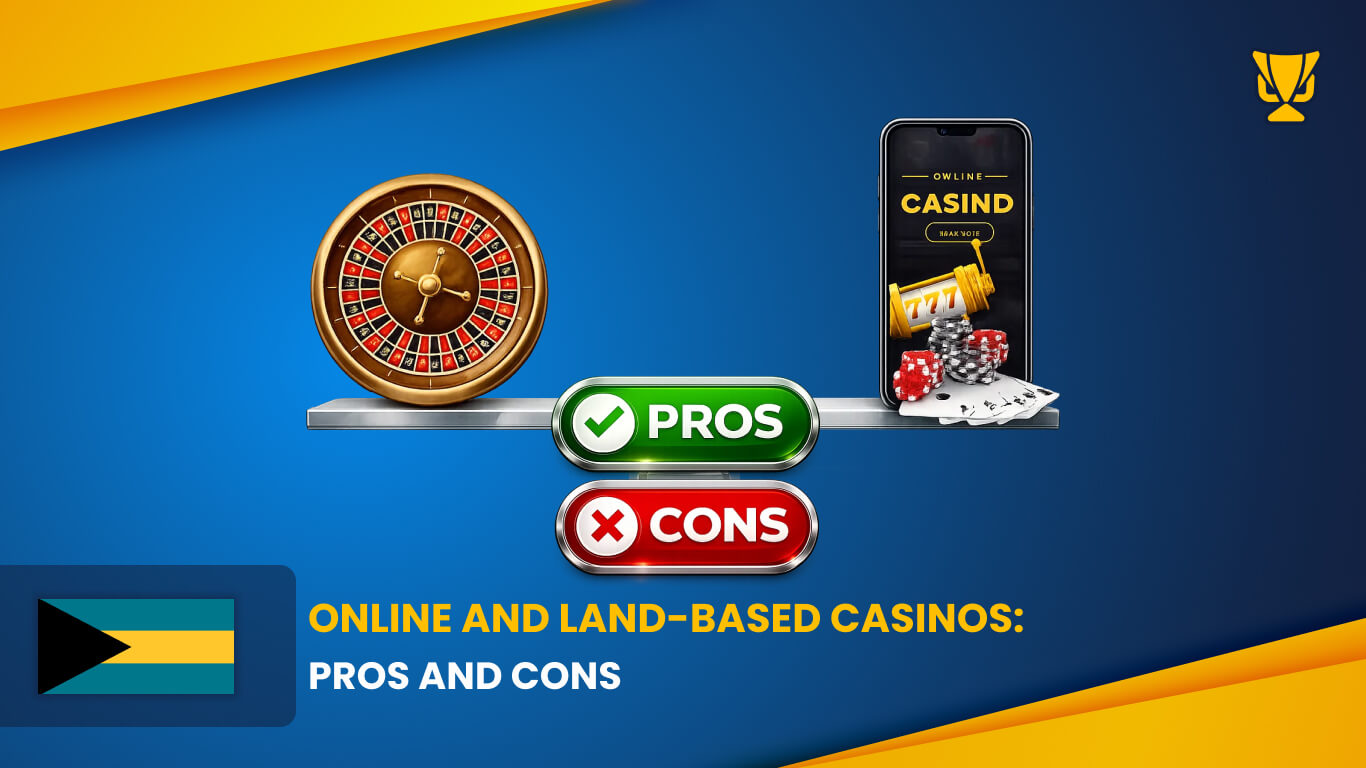Best Bahamas Casinos Online 2026
⏲️ Reading time: 23 minutes


As the captivating turquoise waters of the Bahamas beckon, online casinos introduce a new dimension to this haven for thrill-seekers. The charm of the best online casinos in the Bahamas lies in their capacity to whisk players away to a realm of excitement and diversity that surpasses the traditional offerings of land-based casinos.
| Rank | Casino | Rating | Bonus | Get bonus |
|---|---|---|---|---|
| 1 | 1xBet | 4.8/5 | Welcome Package up to 2120 BSD + 150 FS | Read review |
| 2 |  Megapari | 4.8/5 | 100% welcome bonus up to 320 BSD | Read review |
Get to know the best options for beginning (or continuing, if you’ve been playing for a while) your casino gaming journey. We also included relevant information, such as top payment methods, games, bonuses, and apps, to give you a full overview of your options. Click any of the links here to learn more:

The history of casino gambling can be traced back to the middle of the 20th century when rumors about legality started circulating around the island.
Though there were severe regulations, it was not until 1963 that The Bahamian government, looking for economic diversification, permitted the opening of the first legal casino, Princess Casino.
These developments began transforming the Bahamas into first-class gambling destinations within the Caribbean, offering premier options such as the Monte Carlo at Lucayan Beach Hotel on Grand Bahamas or the Paradise Island Casino. This is where legal changes kicked off, starting with the Lotteries and Gaming Act for the decade of the 1970s.
In the 1980s, casino gambling was instrumental in helping the Bahamas experience a tourism boom. The 1990s saw an era of technology breakthroughs in the gaming world. By opting for advanced gaming tech, they lured in a young, tech-savvy demographic.
From 2000 onwards, The Bahamas began to be a competition for other Caribbean countries. The integrated casino resorts came into existence this decade, combining entertainment, hotels, and casinos to provide an entire experience to tourists. As an adaptation process to online casinos’ emerged, the Bahamas revised its legal system, enacting the Gaming Act (2013), which was a more relaxed regulatory framework.
Preferences in online casinos can be guided by experience, risk appetite, and even skill level. If your selected gaming platform is the sundae, what is that cherry on top that will make everything just perfect? We have found the best casinos for different tastes to keep your gaming experience sweet:
But if you’re happy with your metaphorical sundae as is, rest assured that all these selections have met our strictest criteria.
The oversight of digital betting establishments in the Bahamas is within the purview of the Bahamas Gaming Board (BGB), as dictated by the Bahamas Gaming Act of 2014. Enacted for this purpose, the BGB functions as the principal regulatory body in the country.
The Bahamas Gaming Act of 2014 stands as the foundational legal structure governing gambling laws and regulations in the Bahamas. It delineates the protocols for licensing such entities, operational benchmarks, and regulatory prerequisites that online casinos must adhere to in order to operate legitimately within the jurisdiction.
For an online casino to function lawfully in the Bahamas, operators must secure a license from the Bahamas Gaming Board. The regulatory system places a significant emphasis on safeguarding players, promoting equitable gaming practices, and instituting measures for responsible gambling.
| 🌎 Country | Bahamas |
| 👌 Language | English |
| 💶 Currency | Bahamian Dollar (BSD) |
| 🎰 Popular Casino Games | Slot machines, table games, poker, sports betting |
| ⚖️ Is Gambling Legal? | Yes |
| 🕵️ Gambling Regulator | Bahamas Gaming Board |
| 📃 Gambling Tax | No Taxes on Winnings |
| 💳 Popular Payment Methods | Visa, MasterCard, Bitcoin, Ethereum, Bank Transfers |
With its stunning beaches and vibrant culture, the Bahamas is a paradise for sun-seekers and a hub for online casino enthusiasts. The Bahamas' online casino landscape offers enthusiastic gamers and occasional players many choices. This article will spotlight leading platforms in this vibrant market

In the Bahamas, 1xBet is a standout with its comprehensive range of casino games. This platform is for Bahamian players seeking an exciting online betting experience.
| 💰 Welcome Bonus | Up to $1950 + 150 Free Spins |
| 🎲Popular Casino Games | Slots, Table games, Live Casino games |
| ♠️Suppliers | Microgaming, NetEnt, Playtech |
| 💳 Payment methods | Mobile Money, Visa, Mastercard, Bitcoin |
| 💬 Customer Service | 24/7 Live Chat, Email, Phone |
| ⚠️ Minimum Deposit | $10 |

Megapari has made a notable impact in the Bahamian casino market with its extensive selection of games. The platform's features appeal to Bahamian players, prioritising a high-quality gambling experience.
| 💰 Welcome Bonus | Up to $1500 + 150 Free Spins |
| 🎲Popular Casino Games | Slots, Table games, Live Casino games |
| ♠️Suppliers | Betsoft, Playson, Quickspin, Red Tiger |
| 💳 Payment methods | Mobile Money, Visa, Mastercard, Bitcoin |
| 💬 Customer Service | 24/7 Live Chat, Email, Phone |
| ⚠️ Minimum Deposit | $10 |

22Bet has earned recognition in the Bahamas for its varied casino game collection. Its attractive bonuses have made it a popular choice.
| 💰 Welcome Bonus | Up to $300 + 222 Free Spins |
| 🎲Popular Casino Games | Slots, Table games, Live Casino games |
| ♠️Suppliers | Big Time Gaming, Elk Studios, Nolimit City |
| 💳 Payment methods | Mobile Money, Visa, Mastercard, Bitcoin |
| 💬 Customer Service | 24/7 Live Chat, Email, Phone |
| ⚠️ Minimum Deposit | $10 |

In the Bahamas' vibrant online casino scene, 20Bet is renowned for its outstanding variety of casino games. It is celebrated for its intuitive interface and reliable customer service.
| 💰 Welcome Bonus | Up to $120 + 120 Free Spins |
| 🎲Popular Casino Games | Slots, Table games, Live Casino games |
| ♠️Suppliers | Yggdrasil, Thunderkick, Push Gaming |
| 💳 Payment methods | Mobile Money, Visa, Mastercard, Bitcoin |
| 💬 Customer Service | 24/7 Live Chat, Email, Phone |
| ⚠️ Minimum Deposit | $10 |

1Bet has established a distinct presence in the Bahamas' casino industry, offering a solid selection of games.
| 💰 Welcome Bonus | Up to $100 + 100 Free Spins |
| 🎲Popular Casino Games | Slots, Table games, Live Casino games |
| ♠️Suppliers | Kambi, Betradar, SBTech, Ez and many more |
| 💳 Payment methods | Cards, E-Wallets, Crypto, Bank Transfer |
| 💬 Customer Service | 24/7 Live Chat, Email, Phone |
| ⚠️ Minimum Deposit | $10 |
We compare the Bahamas' top casinos, focusing on key features such as welcome bonuses, game variety, and payment options to help you find the ideal gaming experience.
Since there are so many online casinos to choose from nowadays, we developed a review and recommendation system. The goal is to ensure the uniformity of the process from the first to the last casino, so we identified the criteria that we will use for rating as well. Read more about them below:
Licensing is a prerequisite to move on to further evaluation. The e-gaming license must be from a respected developer to ensure that the gaming platform itself is designed with the player’s protection in mind. Considering the level of investment involved in obtaining a license, having one is proof that it will not just disappear overnight.
A high level of security is achieved through the use of technologies like SSL encryption, as well as the protocols dictated by the privacy policy. Another element of security that tends to be overlooked is trustworthiness. If verified players tend to have a consistently good experience with the platform, you’re more likely to enjoy the same.
Especially for new players who are still building up their funds, having generous bonuses is very helpful. However, we know that this doesn’t paint a complete picture. So, we also read the bonus terms and conditions as well as the specific promotional terms. There, we dig deep into the fine print to learn about and assess any relevant deadlines, wagering requirements, and other conditions.
A good online casino will have a great range of gaming options, which ensures that players will not get bored. Having a lot of variety across game types, sub-types, themes, and features will keep you on your toes. More importantly, a good game selection is necessary to ensure that players across all skill levels will be able to find titles on which they have a great shot of winning.
In terms of payment methods, having a lot of options is highly preferred. This makes it convenient for players to use the platform because they don’t have to create a new financial account to get started. It’s a huge plus if the platform supports flexible transaction limits, too.
Having customer support ensures that you’ll have someone to guide you, whether you’re a new or existing player. It can greatly impact your gaming experience in either direction because it supplements whatever may be lacking on the platform itself. So, for this criterion, availability, means of contact, and resolution time were tested and verified first-hand.
Are you ready to begin your online gaming journey? The process is very easy and straightforward. No matter which online casino you prefer to use, the general steps will look very similar. So, as we discuss each step, there will be a greater focus on best practices and on what you should expect.
Yes or not, since there are already top-notch options to choose from on this page. However, if you want to go through the selection process on your own, start with a shorter list so you can more quickly move forward to the next step.
The most important thing for this part is to ensure that all details are correct. Most online casinos have rules stating there should only be one account per device and IP address. If you enter the wrong details, you may not be able to use the platform once this is detected at verification.
This involves providing proof of address and identity. Upload clear scanned copies to avoid having to repeat the process.
When choosing a deposit method, consider which method you’d also prefer to use for withdrawals. Another important thing to remember is to double-check all details. The online casino will not be liable for any errors on your part.
You’ve done the hard work, and now, it’s time for you to have fun. Just remember responsible gambling principles to keep the experience safe.


If you’re wondering whether trying an online casino will deliver additional value, please refer to the table below. We have outlined the biggest difference between the two:
| Feature | Online Casinos | Physical Casinos |
|---|---|---|
| ✔️ How easy is it to access its gaming options? | Very easy. Just go to the website or the app to start playing. | You need to physically go to the casino to start playing. |
| 🎰 How many games are there to choose from? | It’s normal for an online gaming platform to have thousands of games to choose from. | A lot, but not nearly at the same level as online casinos. They can only offer so many games, depending on the space available. |
| 🎁 What kind of rewards can you get? | A lot. The online casino itself will have bonuses like cashback, deposit match, and free spins. Then, the software developer may also have other promotions, such as drops & wins and tournaments. | You’ll normally just get loyalty rewards, which may be hard to get unless you play a lot. |
With online casinos, you have many ways to get rewarded and leverage these bonuses to get higher chances of winning. Most of the time, all it takes is a minimum deposit to claim a generous reward. Sometimes, all you need to do is to keep doing something that you love: playing casino games! Check out the range of promotions that you can access at online casinos in the Bahamas:
If you’ve just created an account with an online casino, you may be eligible to receive a welcome bonus. This reward is usually more generous than the others offered on the platform. For example, for 1xBet, it goes up to $1,750 plus 150 free spins. Claiming this promotion usually entails making a deposit or verifying your account, email address, and/or number.
This offer is available to new signups as part of the welcome bonus. Particularly, it’s for those who haven’t deposited any money into their accounts yet. It is calculated based on the money that you top up with. For example, with a 100% first deposit bonus, you get an additional $100 in bonus funds on top of your $100 deposit.
Free spins are different from other types of promotions because if there are wagering requirements, they apply to the winnings generated from the reward instead of the reward itself. However, if there’s no rollover, you can withdraw your payout right away. These can also only be used on specific slot titles as indicated in the promotion’s terms. Get this reward by selecting a free spin offer then clicking Get Bonus.
With cashback, you can recuperate some of your net losses or total bet amount. The latter is rare, but you’ll find both on 22Bet. Based on your VIP level, you can receive net loss cashback that can go as high as 11% or a total wager cashback of up to 0.25%. Most offers like this are credited right away. However, if any further action is required of you, it should be written in the terms and conditions.
To incentivize various types of gaming activity on the platform, online casinos offer VIP programs that provide rewards based on total wagers or deposits. What you’ll receive will depend on how the program is structured, but it normally involves a level-up bonus and some permanent exclusive offers. You may even be assigned a personal manager who will ensure you have a great experience on the platform.
The Bahamas Gaming Act of 2014 is a comprehensive legislative document overseeing all facets of gaming pursuits in the country, encompassing both physical and online casinos. The key stipulations of the act include:
The act empowers the Bahamas Gaming Board (BGB) to grant licenses to online casino sites engaged in gaming activities. It details the stringent licensing procedures, including the criteria that operators must satisfy to obtain and retain a license, while also prohibiting illegal practices in their gaming establishments.
The legislation categorizes various licenses, encompassing casino licenses, interactive gaming licenses tailored for online operators, and supplier licenses applicable to entities providing gaming equipment or services.
Emphasis is placed on the necessity of fairness and integrity in gaming operations. The act delineates standards for game rules, equipment, and procedures, such as Random Number Generators (RNGs), to ensure equitable gaming and reasonable winning opportunities for players.
The legislation incorporates provisions aimed at safeguarding players at Bahamas casinos, including measures to forestall problem gambling and the establishment of self-exclusion programs. Operators are mandated to implement policies promoting responsible gaming and disseminate information on such practices.
Robust AML provisions are integrated into the act to counteract money laundering and other financial crimes within the gaming sector. Operators are obliged to implement rigorous customer due diligence procedures and report suspicious transactions detected through computer algorithms to relevant authorities.
The Bahamas Gaming Board is endowed with the authority to enforce compliance with the act and monitor all gambling laws and regulations in the Bahamas. It possesses the power to conduct investigations, audits, and inspections of gaming operations. Penalties, such as fines and potential license revocation, may be imposed in the event of non-compliance with the provisions of the act.
In the Bahamas, the commitment to financial transparency in the gambling industry is underscored by its standing on the 2022 Corruption Perceptions Index (CPI) reported by Transparency International. Scoring 64 points out of 100, the Bahamas reflects a concerted effort toward mitigating corruption within the country.
The Bahamas government, led by Economic Affairs Minister Michael Halkitis, has significantly boosted the gambling industry by repealing the patron winnings tax. The tax on patrons' winnings, initially implemented during the Minnis administration, levied rates ranging from five percent for winnings up to $1,000 to 7.5 percent for amounts exceeding $1,000.
The decision to revoke this tax aligns with the government's commitment to promoting economic growth rather than implementing austerity measures. Consequently, there are currently no tax obligations on winnings from online casinos in the Bahamas. Halkitis emphasized the philosophy of fostering a thriving economy to restore the nation's finances, making it easier for businesses to operate and attracting investments.
To enhance the gaming experience for players, online casinos in the Bahamas offer a diverse range of payment methods. Common choices encompass credit and debit cards, e-wallets, bank transfers, and prepaid cards. This variety of payment options empowers players to choose the best method that suits their preferences and convenience.






| Payment Type | Payment System |
|---|---|
| E-Wallets | PayPal, MiFinity, Neteller, Payz, SticPay |
| Credit/Debit Cards | Visa, Mastercard, Maestro, American Express, Fidelity Debit Card |
| Bank Transfers | SWIFT Wire Transfer, Instant Bank Transfer, Fidelity Banking, Scotia Banking |
| Cryptocurrencies | Bitcoin, Ethereum |
| Prepaid Cards | BOB VISA Prepaid Card, Western Union NetSpend Prepaid MasterCard |
| Mobile Payments | Apple Pay, Google Pay, Trustly |
In the vibrant casino scene of the Bahamas, a plethora of games entice visitors with diverse preferences. Classic table games at free game casinos, including blackjack, poker, roulette, and baccarat, offer an immersive and strategic gaming experience.
The allure of slot machines is heightened with popular titles like "Wheel of Fortune," "Coin Volcano," and "Buffalo Gold," creating an exciting atmosphere on the casino floor.
Video slots, such as the thrilling "Treasures Aztec" and the adventurous "Buccaneer Royale," captivate players with engaging themes and enticing bonus features. Last but not least, for Bahamian poker enthusiasts, video poker options like "Jacks or Better" and "Deuces Wild" add a strategic dimension to the gaming portfolio.
Slots are the most popular casino games in the Bahamas and literally everywhere else, thanks to their beautiful and hypnotic displays and easy gameplay. To win, all you need to do is to get the reels spinning and land an accepted formation of symbols. The system even identifies any payout from the spin and automatically collects it for you.
Modern slots have a great range of features. The most common of these are wilds and scatters, which can be found on classic, 3-reel, 5-reel, video slots, and progressive jackpots. Other variations of the games have also been introduced, including the gamble mode and novel game mechanics.
If you want to use skills instead of luck to win the game, blackjack is the real deal. With the lowest house edge, this game is the most suitable for skilled players seeking the highest chances of winning. The goal is simple: beat the dealer’s hand and obtain the hand value closest to 21 without going over. This is the same for various versions like Perfect Pairs and Double Exposure.
To boost odds, some players use card counting systems like Hi-Lo, where cards 2 to 6 subtract one from the true count while Jacks to Kings add one. An alternative to keeping count is using an odds calculator, which tells you your odds of winning.
Roulette is the most popular live game for many reasons: it’s easy to play, fast-paced, and flexible. There are many kinds of bets that you can make, like corners, straights, and pairs with different odds and payouts. Your payout is determined based on the outcome of the roulette spin.
Because of the huge market for this game, software developers have created their own versions. An example is Lightning Roulette, which assigns a multiplier to random single numbers, which increases the potential payout of players who bet on them. Another is Triple Bonus Spin by IGT, which adds the exciting triple bonus round. To improve the potential win, many bettors use systems like D’Alembert, Martingale, and Kavouras.
With baccarat, you simply bet on the player or the banker. The hand with a value closest to 9 wins the round. This fast-paced game started in 19th century France, and today, there are a lot of versions that you can try. For an oriental touch, Dragon Tiger is the way to go. Another interesting version is the Deux Tableux, where the banker plays against all players.
With video poker, you get five cards. Then, the value of that hand determines whether you’re eligible for a reward. There are many versions of this game, all of which require an understanding of the value of the different hands. For example, a trio is lower than a straight but better than a pair. A variation of the game that you may see is Anything’s Wild, where you pick the round’s wild card before it begins. However, the most popular is Jacks or Better, where you need at least a pair of Jacks to get a payout.
Mobile gaming may still be on the rise, but it already has completely dominated the casino gambling industry. It’s more convenient and accessible than playing on a desktop, making it the preferred way of playing nowadays.
But even though all online casinos are accessible on mobile, not all their games will be. What truly made mobile casinos a huge success is the adoption of HTML5 technology, which vastly reduced the bandwidth needed to play games. So, developers that have not yet abandoned Flash plugins will have titles that can’t be played on the go. Fortunately, this is rarely an issue if you choose reputable online platforms that feature content from modern game studios.
Did you know that mobile gaming can be made even more convenient? This is thanks to casino apps that let you enjoy faster loading times and one-tap convenience. If this is something that you’re interested in, these are your top options:
Even though live casinos weren’t a hit when they were first attempted, they are now popular everywhere. They mix the benefits of accessibility of the gaming options right from your phone and the social interaction that you are used to at a physical casino.
With the titles here, there are live dealers who manage the flows and transitions of the game and real tables where you can take your virtual seat. However, no matter which of the diverse game types you can play with a live dealer, they all have one common feature: every title mixes technology into the experience in a way that will create smooth gameplay.
The online casino gambling industry is continuously expanding possibilities, the best of which are most likely reflected in the newest online casinos. For the best newly launched gaming platforms, check these out:
As the industry continues to release more innovations, this list can quickly change. So, be sure to check back now and again to see the latest updates.
In recent times, the Bahamas has observed a burgeoning casino scene, particularly in the realm of poker. The poker landscape in the Bahamas is undergoing rapid evolution, witnessing a growing number of poker competitions attracting participants globally. The Atlantis Casino, situated on the renowned Paradise Island, stands as a symbol of the nation's dedication to providing top-notch gaming experiences.
This casino, renowned for its lavish atmosphere and cutting-edge amenities, has become a central hub for these occasions. As the poker sector experiences continuous growth, there is a tangible sense of anticipation that the Bahamas might witness the rise of some noteworthy players.
With the appeal of high-stakes tournaments and the potential for substantial prizes, the Bahamas is positioned to foster poker talent. Events like the World Series of Poker are soon coming to the Bahamas, showing the country’s rising appeal.
Tournaments like the annual PokerStars Caribbean Adventure, held at the Atlantis Casino, serves as prime example of esteemed events that draw both seasoned professionals and aspiring players to the lively Bahamian shores. As the poker community in the Bahamas expands, it would not be unexpected if the nation gives rise to some of the most lauded and skilled casino players in the future.
The future of the gambling industry in the Bahamas appears robust, bolstered by substantial economic contributions and a strategic vision for expansion. The seven gaming operators, pivotal contributors to the sector, sustain 3,881 jobs and generate over $101 million in income nationwide. With the Bahamas ranking among the top 30 global casino destinations, the Atlantis casino stands out as a formidable revenue earner, surpassing $128 million.
Government and Grand Bahama Minister Ginger Moxey's endorsement of further casino development reflects a commitment to capitalizing on the industry's potential. Notably, the industry demonstrated sustained growth, generating $131 million in revenue from January to September last year. With technological advancements like augmented reality and virtual reality and an increasing acceptance of online platforms, the Bahamas is poised to witness a surge in virtual casinos.

There may be no way to win for sure every time, but you can stack the odds in your favor. After observing winners and top players, we have identified common practices and tips that you may also bet from incorporating into your betting activities:
At the heart of all the tips above is collecting updated information. Leverage what you already know to minimize potential losses and maximize potential wins.
Always choose the best online casino in the Bahamas that provides holistic entertainment in a safe environment. Play in only legitimate casinos with reliable transaction systems and a multilingual 24-hour customer hotline. Also, ensure you look into Bahamian-targeted bonuses and promotions. Check on reviews and comments from other players to find out whether the casino is fair and honor their payments as fast as possible.
The Bahamas Responsible Gaming Association (BRGA), as well as other associations with a similar intent, help enhance responsible gaming practices while aiding individuals who are impacted negatively by gambling addiction. During a recent Caribbean Regulators Forum and Gaming Show held in the Bahamas, the Chairman of the Gaming Board addressed these concerns related to gambling addiction and abuse. He particularly spoke about Sandilands Rehabilitation Center (SRC) to suggest including a criminal justice system in the legislation.
In keeping a check on both local and international gaming institutions, the chairman expressed concern about the need to acknowledge red flags, especially where people are involved in a reckless and irresponsible manner.
The Bahamas embraces a proactive approach as this emphasizes the resolution of gambling issues while upholding responsible gaming standards in the country. You should go to the National Council on Problem Gambling Helpline (www.ncpgambling.org). There is also a helpline that provides free and confidential phone service (1-800-522-4700).
Online casinos in the Bahamas protect player data through encryption protocols, secure payment gateways, and two-factor authentication.
Yes, blockchain technology in the Bahamian online casinos is being considered, focusing on its impact on transparency, security, and the overall gaming experience.
Responsible gambling measures adopted by online casinos in the Bahamas include self-exclusion programs, limit-setting options, and partnerships with support organizations where you may seek help.
The social responsibility initiatives of online casinos in the Bahamas include charitable contributions, community development projects, or collaborations with local businesses.